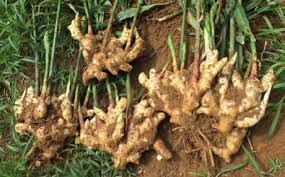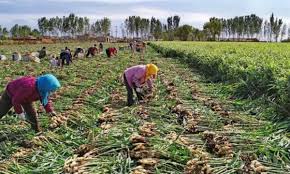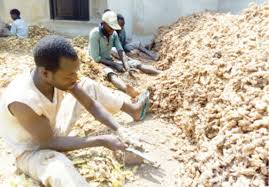![]()
If you’ve landed on this article page, you’re probably searching for a
good business idea—an idea that’s light on the pocket but heavy on
returns, promising both a fulfilling journey and potential profit.
|
How to start Ginger Farming in Nigeria
Ginger farming is the practice of cultivating ginger plants for
commercial purposes. Ginger farming has become a lucrative
agricultural venture due to the high demand for ginger in
Nigeria and Africa for both local consumption and exportation.
Ginger farming involves land preparation, planting, irrigation,
pest and disease management, and harvesting. In Nigeria, ginger
is usually cultivated in the northern and southern parts of the
country, with Kaduna, Bauchi, and Gombe states being major
producers. Ginger farming has been shown to be a profitable
venture, with an estimated yield of up to 20 tons per hectare.
According to research by the National Horticultural Research
Institute (NIHORT), improved ginger varieties have a potential
yield of up to 27 tons per hectare in Nigeria.
In addition to its profitability, ginger farming is also a
sustainable agricultural practice that can promote soil health
and biodiversity. Ginger has also been found to have several
health benefits, including anti-inflammatory and anti-cancer
properties. As a result, the demand for ginger has been steadily
increasing, with Nigeria having the potential to become a major
exporter of ginger in Africa. With proper farming practices,
ginger farming can be a profitable and sustainable agricultural
venture for small-scale farmers in Nigeria and Africa.
Planting Method: Ginger can be planted using the rhizome or seed
pieces. Cut the ginger rhizomes into pieces with at least one
bud or eye. Soak the seed pieces in water overnight to soften
them and promote sprouting. Plant the ginger seed pieces about
5-10 cm deep in the soil, with the bud facing upwards. Space the
seed pieces about 20-25 cm apart in rows that are 30-40 cm
apart.
Irrigation: Ginger requires consistent moisture for optimal
growth, but it is important to avoid waterlogging as it can
cause root rot. Water the ginger plants regularly, keeping the
soil evenly moist but not waterlogged. Avoid overhead watering
as it can cause fungal diseases. Drip irrigation or furrow
irrigation can be effective methods for ginger farming in
Nigeria.
Crop Management
Weeding: Ginger plants are susceptible to weed competition,
which can hinder their growth. Keep the ginger farm weed-free by
regularly removing weeds manually or using appropriate
herbicides. Avoid using herbicides that can harm the ginger
plants or the environment, and follow the recommended dosage and
safety precautions.
Fertilization: Ginger requires proper nutrition for optimal
growth and development. Conduct a soil test to determine the
nutrient status of the soil, and apply fertilizers accordingly.
Apply well-balanced fertilizers rich in nitrogen, phosphorus,
and potassium during planting and throughout the growing season.
Organic fertilizers such as compost or manure can also be used
to supplement the nutrient requirements of ginger.
Pest and Disease Control: Ginger plants can be vulnerable to
pests and diseases, which can reduce yields. Keep a close eye on
the ginger plants and promptly identify and treat any pest or
disease infestations. Common pests of ginger include aphids,
mites, and thrips, while common diseases include rhizome rot,
fusarium wilt, and bacterial leaf spot. Use appropriate
pesticides and fungicides to control pest and disease outbreaks,
and follow the recommended application rates and safety
precautions. Implement good cultural practices such as crop
rotation, proper spacing, and sanitation to prevent pest and
disease buildup in the ginger farm.
Mulching: Mulching can be beneficial in ginger farming as it
helps conserve moisture, suppress weeds, and regulate soil
temperature. Apply a layer of organic mulch such as straw,
leaves, or grass clippings around the ginger plants, taking care
not to cover the rhizomes. Mulching can also add organic matter
to the soil as it breaks down, improving soil fertility and
structure.
Harvesting and Post-Harvest Handling
Harvesting Time: Ginger takes about 8-10 months to mature,
depending on the variety and growing conditions. The leaves of
the ginger plant will start to turn yellow and dry up when the
rhizomes are ready for harvest. The best time to harvest ginger
is when the leaves have dried up but before the rhizomes start
sprouting again. Carefully dig up the ginger rhizomes using a
fork or spade, taking care not to damage them.
Post-Harvest Handling: After harvesting, gently clean off the
soil from the ginger rhizomes and allow them to dry in a
well-ventilated area for a few days. Avoid direct sunlight, as
it can cause sunburn on the ginger rhizomes. Once the ginger
rhizomes are dry, trim off the tops and roots, leaving about 1-2
cm of the stem attached to the rhizome. Sort and grade the
ginger rhizomes based on size and quality, and pack them in
ventilated crates or bags for storage or transport.
Marketing
Local Market: Sell ginger in local markets, grocery stores, or
supermarkets in your area. Build relationships with local buyers
such as spice traders, processors, or wholesalers. Advertise
your ginger through word of mouth, posters, or social media to
attract customers.
Export Market: Ginger has a high demand in the international
market, particularly in Asia, Europe, and the Middle East.
Explore opportunities to export ginger by complying with the
export requirements and regulations of the target countries.
Connect with export agents, trade organizations, or ginger
exporters for guidance on exporting ginger.
Ginger farming can be a profitable venture in Nigeria with the
right knowledge, practices, and marketing strategies. Proper
land selection, soil preparation, seed selection, irrigation,
crop management, and post-harvest handling are crucial for
successful ginger farming. Implement good agricultural
practices, monitor for pests and diseases, and follow
recommended guidelines for harvesting and post-harvest handling.
Market your ginger locally and internationally, and explore
value-added product options to increase your profits. With
dedication, hard work, and sound agricultural practices, you can
achieve success in ginger farming in Nigeria.
Get our Practical Training guide on Ginger Farming Business in Nigeria. This guide will provide a detailed roadmap on how to start a Ginger farm in Nigeria, from market research to operational strategies, ensuring you have all the information needed to succeed in the Ginger Farming in Nigeria.
|







